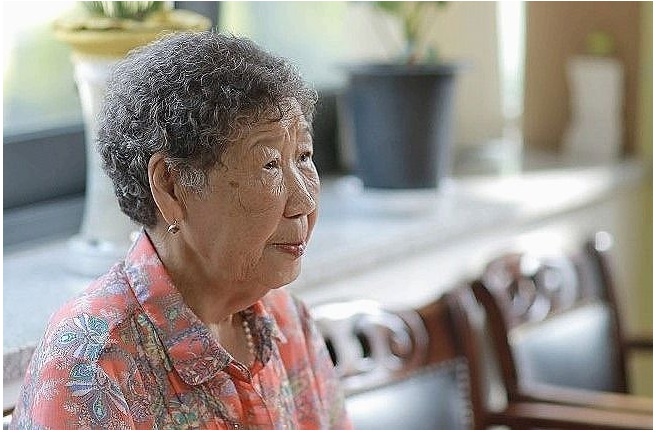The scars of war

Kang Il-chul, a former sex slave for the Japanese military during the World War II, poses for a photo at the House of Sharing in Gwangju, Gyeonggi Province, Monday. (Ministry of Gender Equality and Family)
Kang Il-chul was only 16 when she was abducted by three Japanese military officers in her hometown of Sangju, North Gyeongsang Province. It was in 1943 in colonial Korea, and Kang had just returned home from school. Her parents weren’t home.
“They said, ‘Put on your shoes and come out,’ and I obeyed,” Kang said in an interview with local media outlets Monday. “I could not resist. Resisting against Japanese officers meant risking your life at the time. They could kill you at any moment.”
Kang’s life as the darling youngest daughter of 12 siblings changed instantly. She was forcibly taken to China to work as a sex slave for frontline Japanese soldiers stationed there. Until Japan’s defeat in 1945, Kang was forced to work in military brothels, enduring both sexual and physical abuse by the soldiers.
According to Kang’s past testimonies, she was forced to have sex with about 10 to 15 soldiers daily during her years as a slave. When the war nearly ended in 1945, she developed severe typhoid fever. The Japanese placed her outside of the military base to be cremated alive with corpses, thinking she would soon die from the disease. Kang was eventually rescued by Korean independence soldiers stationed in China. The 87-year-old still has scars on her head from the experience.
“I still wake up in the middle of the night and cry,” she said. “I can’t control the tears. Sometimes I can’t even sleep.”
Article continues after this advertisementSome 200,000 women were forced into sexual slavery by the Japanese during World War II, and a handful of the surviving women, including Kang, are spending their final years in the House of Sharing, a special shelter and museum in Gwangju, Gyeonggi Province.
Article continues after this advertisementIn South Korea, most of the victims have already died from old age. There are now only 47 registered survivors, including Kang and nine other women residing at the House of Sharing.
Among the victims, Kang is considered one of the most active and vocal women in the movement asking for an official apology from Japan. Last month, she flew to New York to speak at the Holocaust Memorial and Tolerance Centre of Nassau County about her experience as a sex slave in an attempt to raise awareness of Japan’s wartime atrocities. Kang is also scheduled to visit the museum again next March to celebrate the opening of a special exhibition featuring her and other victims’ stories.
“It’s not always easy to share my story,” she said. “Sometimes I don’t want to do it because I don’t want to cry in front of others while talking about it. But I understand the importance of it now. I have to share it so what I had to deal with does not repeat in the future.”
In spite of the victims’ activism and Seoul’s repeated demand for an apology and legal reparations, Tokyo has claimed that all compensation was settled in the 1965 South Korea-Japan Normalization treaty.
For Kang, it is not only the abuse she endured that she wants to be compensated for. It also has to do with the loss of her youth, her home, her family and her country, she said. “I don’t know if anyone can even imagine what it means to lose everything like that,” she said. “It was better to be dead.”
Kang remembers the Japanese being violent and inhumane toward Koreans in Sangju, even before she was abducted to China. Many, including Kang’s parents, lost their harvest and food to the Japanese officers, who would break into homes abruptly and randomly with swords. “If you resisted, you would be beaten to death on the spot,” Kang said.
As children, Kang and her friends would run to the nearest farm and hide by lying with their faces down, whenever they saw Japanese officers.
“We never knew what they would do to us,” she said.
“I will try my best to live as long as I can to ensure that people remember what I had to endure.”
After World War II, Kang married a Chinese man and worked as a nurse in China’s Jilin province until she returned to Korea in 2000. The first place she visited upon her return was her family house in Sangju. The house, which was once filled with her favorite childhood memories, was empty as all her siblings and parents had passed away.
As the youngest child of her family, Kang would often sleep next to her mother in the same room. Her parents would save dried persimmons and jujubes from their tree just for her. Even on the day she was taken away by the Japanese in 1943, she rushed home from school to see her mother as soon as possible. Kang never got to say good-bye.
“I collapsed on the floor and wailed (the day I returned to my old house),” she said, tearing up. “I’ve always missed my mother. I still miss her terribly.”
RELATED STORIES
North Korea says ready for ‘all-out war’
Kim Jong-Un orders frontline N. Korea troops onto war footing